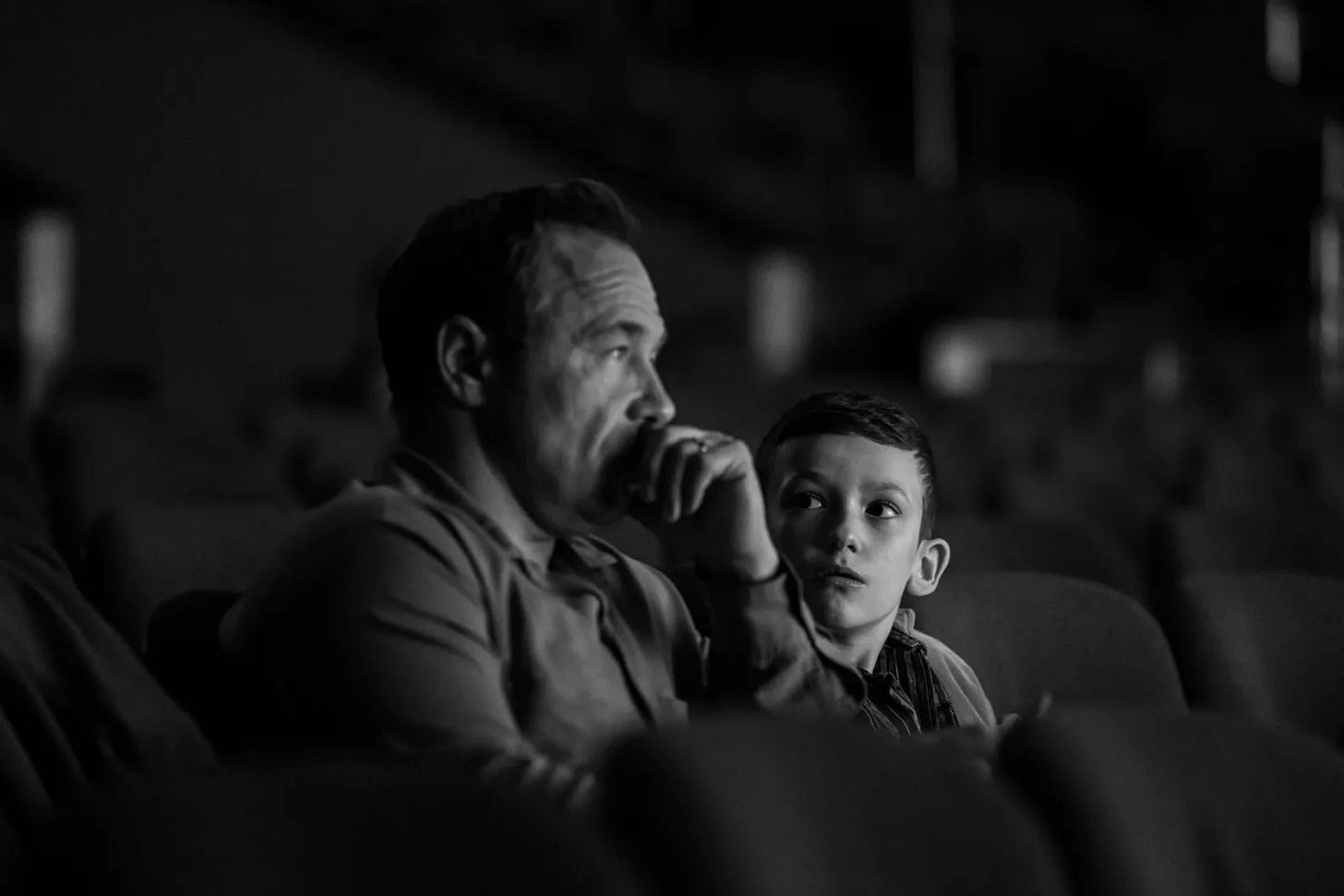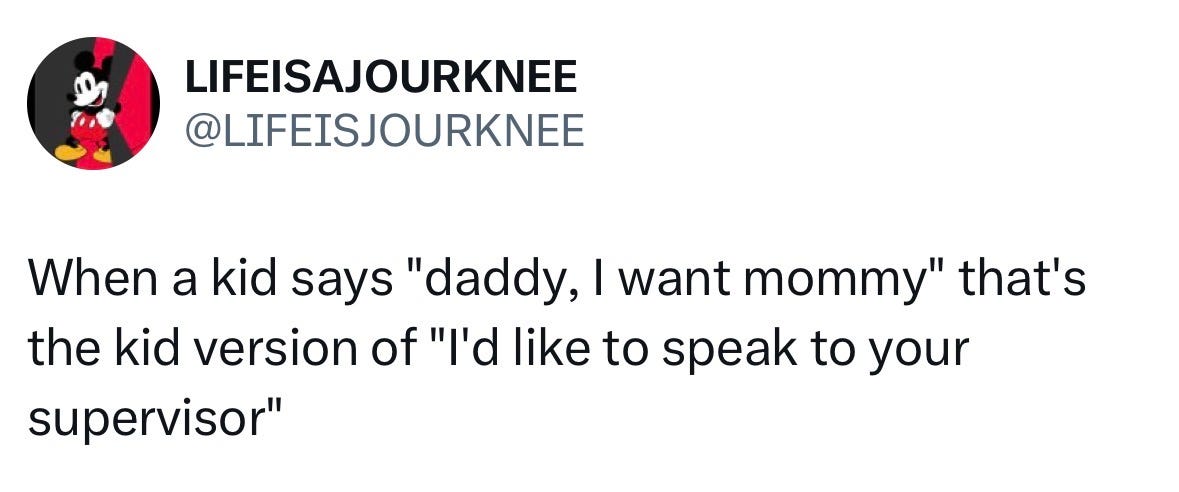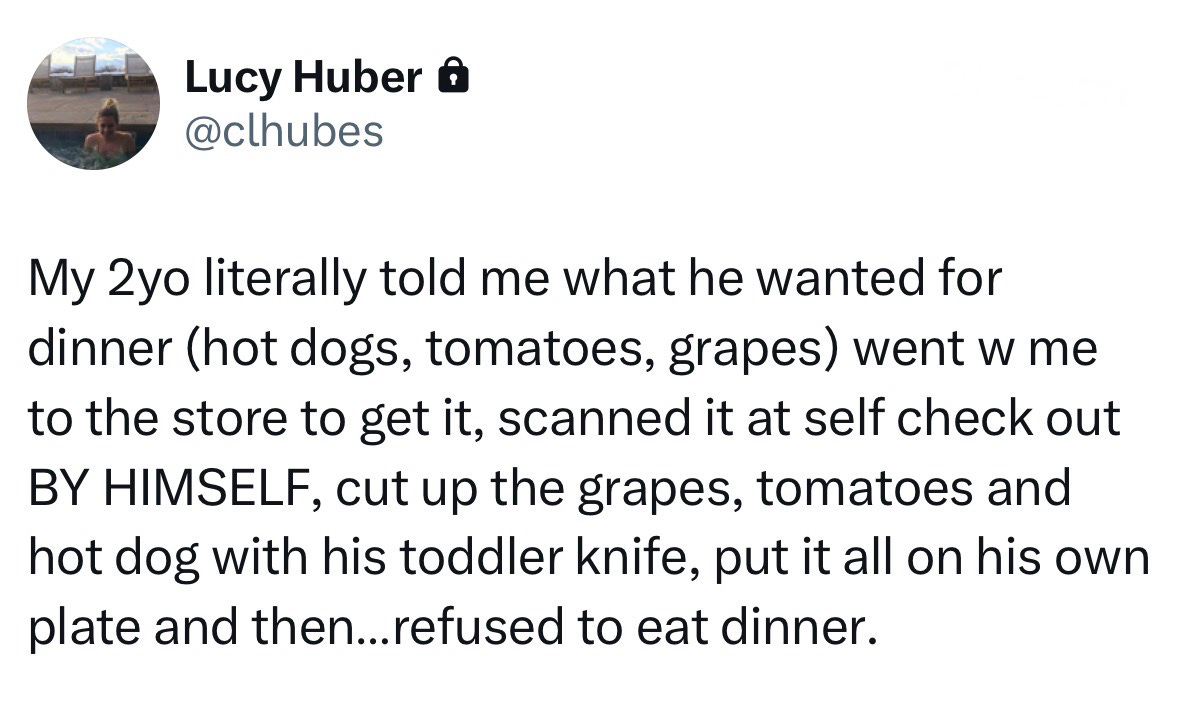Bruce, Bono and Bawling Your Eyes Out
Fathers in film, and the emotional inheritance we’re refusing to pass on
Since my son was born, I can’t help but cry at a movie.
I don’t know if there was a tipping point. Maybe it came fast, a rock launched through my glass case of emotion. Perhaps it was that gradual opening of a valve that marked empathy. It’s not like I didn’t cry before. The Green Mile remains seared into my mind: a daytime DVD viewing when I was 19, the postman looking on, terrified, as I answered the door puffy-eyed, tears streaming down my face.
Fast-forward to fatherhood, and it’s no longer just the big tear-jerkers. Kids’ movies are my kryptonite. I’m destroyed every time I watch Moana crest across that wave formation with her stubborn determination—a young girl asserting her independence, leaving her family behind to forge her own path, my eyes glistening as Opetaia Foa’i’s Samoan voice glides alongside Lin-Manuel Miranda’s melodies. Or when I’m watching Inside Out’s Riley struggle with her Joy, Anger, Sadness, Fear and Disgust after her parents move her to San Francisco for a new job (that one hit a little too close to home). Don’t get me started on Coco. I really shouldn’t have watched that the same month my grandma moved into a retirement home with advanced dementia. “Remember Me” destroys me every time.
The Greek philosopher Heraclitus once observed that “A man cannot step into the same river twice; it is not the same river, and he is not the same man.” I can say, with absolute certainty, that as your children get older, there will be cinematic worlds you step into again and experience with a new set of eyes. I’ll never forget that transatlantic flight—my newborn daughter a few months away from making her first appearance—when I watched Finding Nemo afresh, a new perspective provoked by the imminent arrival of a child:
I cried more during that 1 hour and 40 minutes (including credits) than in the 3 months previous. You could blame the high altitude, or the fact I was drinking for two, “taking one for the team” while my wife drank her sparkling water. But looking back, the tears were driven by the first complete perspective shift I experienced as a soon-to-be father. I thought about the first time I saw Finding Nemo: 20 years old, after falling out with my own father, having not been on speaking terms for a few months. Back then, I saw the movie from Nemo’s perspective: Why wouldn’t his dad just leave him alone? Let him live the life he wants to live? To go and experience the world outside of their tiny coral home? To see what adventures the great sea could bring?
Flash forward, Lost-style, 10 years later, and I experienced a different film. A man who was working through the trauma of losing his wife, just as their son was born. Navigating that grief by being overprotective of his only child—all he wanted to do was protect Nemo!—to keep him safe, knowing the danger that was clear and present out there.
You better believe I was in bits.
It’s been a slippery slope since those salty tears mixed with my sky-high gin and tonic. I’ll start welling up at almost anything now. It’s a running joke in the house: as soon as the strings begin to stir, my family will look around inquisitively, searching for the telltale glint of a moistened eye. It happens during those movies intentionally crafted to tug at the heartstrings. But it even comes from those that do not.
Take Sing 2. It’s good, wholesome fun for the whole family. The cast is top-tier, with stars like Matthew McConaughey, Reese Witherspoon and Scarlett Johansson lending their talents, alongside Adam Buxton, Nick Offerman and Pharrell Williams. The songs are catchy as hell—my son spent most of 2022 asking our smart speaker to play “Sky Full of Stars” on repeat—with enough hits peppered throughout to keep the grown-ups locked in. The sequel’s soundtrack includes, but isn’t limited to, covers of Yeah Yeah Yeahs, Prince, The Steve Miller Band and Drake, and shockingly manages to feature The Weeknd’s “I Can’t Feel My Face,” the only ode to cocaine ever to hit the top of the Billboard Hot 100. (I’m sorry, Bing Crosby’s White Christmas does not count.)
The thrust of the movie centres on a touring group of performers who, in an attempt to strike it big in Redshore City (an ersatz Las Vegas), pitch a studio executive on a sci-fi musical. In the middle of an audition, they launch into a rendition of U2’s “Where The Streets Have No Name” and convince the exec they’ve already locked down the rights to the band’s back catalogue for their show. The only problem? They haven’t done anything of the sort. So they set off to convince a grumpy old lion to come out of retirement and help them out—said lion voiced by Bono himself.
The first time I cried during the movie, I just put it down to a normal emotional response. But the second time, watching it intermittently while in and out of the kitchen making dinner, I noticed something else stirring within. It was The Joshua Tree. I was listening to my childhood. The album that transformed a popular Irish quartet into a worldwide tour de force, a stadium-filling rock band that filled the diaspora of the Emerald Isle with pride, and a not-insignificant amount of relief that their home country would not just be known for the fiddle, tin whistle and the bodhrán drum.
Is there a better opening trio of tracks, on any album, ever, than “Where the Streets Have No Name,” “I Still Haven’t Found What I’m Looking For”, and “With or Without You”? You could argue they’re three of the greatest rock songs committed to tape. The album opens drenched in religious light, Brian Eno’s production shimmering throughout. It came together as the band were coming down from the highs of 1985’s Live Aid, written whilst touring across the US, Bono reading Raymond Carver novels and experiencing the American Dream through the eyes of an Irish immigrant. He spent time hanging out with Mick Jagger, Keith Richards and Bob Dylan, having his eyes opened to the potential of marrying traditional Celtic folk with American blues. The Edge took a while to be convinced of this new direction, but after the tour bus tuned into local public radio stations, he was introduced to guitarists like Howlin’ Wolf, Robert Johnson, and Lefty Frizzell, and soon came on board.
Whatever you might say about Bono—and I’ve certainly heard worse than whatever you’re thinking— you’ve got to respect a movie that hinges its plot on convincing a washed-up rock star to come out of retirement for one last hurrah and getting him to license his back catalogue for a piece of family entertainment. I wasn’t expecting a dose of post-modernism on family movie night, but it was served piping hot. U2’s greatest hits are featured throughout, including a perfectly pitched rendition of “Stuck in a Moment You Can’t Get Out Of” (originally written when Bono was grieving the death of his close friend Michael Hutchence), ensuring I was emotionally wobbly throughout, and was entirely done by the time—incoming spoiler alert for a kids’ movie that came out five years ago—he slowly walks onto the stage to one of The Edge’s many iconic arpeggios, and begins to belt out the opening bars to “I Still Haven’t Found What I’m Looking For” to a crowd of fans.
My kids now roll their eyes when they see mine dampen. And that can only be a good thing, because the archaic archetype of the emotionally unavailable dad still looms large over popular culture. The impact that U2 had in my Irish household was reflected in America’s obsession with its own homegrown troubadour, Bruce Springsteen. Born in the USA was another album that played regularly in the Maguire household, but with so-so reviews of the biopic Springsteen: Deliver Me from Nowhere, I was prepared to give it a pass. It was my dad who suggested I watch it, and it received further confirmation from our resident Dadscord movie buff, Carlos, who noted, “[although] it bombed critically and commercially, it is well-made and handles depression and the sins of our fathers.”
Pretty much the sweet spot of The New Fatherhood. Consider my interest piqued. So last week I bought my ticket and sat down for The Tale of Two Jeremys—Allen White and Strong. Unbeknownst to me, Adolescence’s Stephen Graham takes up the mantle of troubled dad for the second time this year, inhabiting the role of Springsteen Senior: Bruce’s violent, alcoholic father, a man whose feelings were numbed with a bottle, whose love was only permitted to be displayed in two ways: silence or rage. Through regular flashbacks, the movie depicts the quiet chaos of growing up in a violent household with eerie accuracy: a place where the sanctuary of home was nothing but; where a gathering in the kitchen could turn, in a heartbeat, from a place of nourishment into a world of pain.
In the foreword for Terry Real’s Us, Springsteen writes of the realisation he “was subject to a legacy that had been passed down from generation to generation in my Italian-Irish family. A long and stubborn stream of mental illness and dysfunction manifested itself in my life as a deep, recurring depression and emotional paralysis.” The film captures one year of his life, as he begins to come to terms with these emotions, transmuting his pain and trauma into art. He learns how to stop this cycle—to share his truth, to find others to help him talk through his pain, and, in his words, to “break the chain of trauma and illness whose price is compounded with each successive generation.”
As I left the theatre, I wondered what might have been different if the last generation of men had been able to communicate their emotions with words rather than their fists. What might our world look like if those dads had been able to sit down, look their kids in the eye and say, “I’m hurting, and I don’t know how to deal with it?” We could be living in a world with less conflict. Maybe we’d have fewer iconic cultural artefacts born from the processing of that pain. But we’d also have fewer adults who had to grow up learning to read the weather from their father’s mood swings, or the sound of their footsteps in the hallway. Today, I’m working to ensure my kids don’t need a movie, a book, or a record to understand what’s going on inside their dad—they can just look across the couch and see it all over my face.
3 things to read this week
“The Power of a Good Cry” by Wesley Morris in The New York Times. No context necessary as to why I’m sharing this one first. A beautifully written essay on how crying helps us connect—to ourselves, and each other. It also contains lines like “[feeling] was the ancient power of art to make a puddle of us.” Highly recommended if you want to carry on getting all up in your feelings.
”Why Men’s Health Matters to Everyone” by Richard Reeves in Of Boys and Men. Richard V Reeves’ newsletter has been essential reading for anyone attempting to make sense of what it means to be a man today, and to help guide the sons we are raising. This week, he hands his platform over to the Director of Men’s Health at Movember, who talks of impending fatherhood, and how he is feeling the need to deal with his depressive father’s death and the inheritance of “[not] just grief but a forensic understanding of how one man’s untreated pain detonates across a family system.”
“What Did Men Do To Deserve This?” by Jessica Winter in The New Yorker. A state of the nation on modern masculinity, an ongoing conversation that has been re-ignited with Scott Galloway’s recently released Notes on Being A Man. Winter covers Galloway, Gavin Newsom, Donald Trump, and the “increasingly despondent mood among young men” as they attempt to navigate this moment of crisis: “deaths of despair; dislocation and broken families; dependency.”
Previously on The New Fatherhood
This month’s essay on searching for collective effervescence on the dance floor really struck a chord with many, and I’m still getting notes two weeks later. One Dadscord dad shared he was going to a festival last weekend and that “[if] I don’t get home till the early hours, at least I can blame it on a newsletter.”
Here are a few of the best messages from you all:
Thought you might be advertising John Lewis at the start, and then you got so personal about your own music obsession, and then you broadened it out to talk about religious experience, meaning, and fatherhood-- citing all different kinds of experts, but managing to bring it back to your own quasi-spiritual practice of inviting dads out to the club, and I felt so connected to your mission.
You really know how to tug at the emotional heartstrings. This stirred a lot of memories of clubbing back in the 90s, and also that search for male connection in current times, as I endlessly work from home.
Dancing of yesteryear wasn’t to house music but hardcore. Over the last couple of months, I’ve found myself out at Deftones, Idles, and Turnstile shows, not quite stage diving myself, but getting close enough for these old bones - and thinking how much I’ve missed the “collective efferfuckitall” of getting kicked in the head while screaming my face off.
The loss is self is a real problem for dads, and it made me feel not so alone. It’s only this year that I’ve been back to many live music shows after an eight-year hiatus. I would go to one or two shows a year when my son was little, but I’ve logged 12 during this calendar year. It’s good to feel alive AND be a dad.
This helped me see the “something” that I’ve felt was missing the past few years but haven’t quite been able to pinpoint. I see now that it’s not just release, not just “me time,” not just the carefreeness that comes with seeing a show or having a few drinks — but the feeling of experiencing something as part of a COLLECTIVE, something bigger than yourself. Thank you so much for sharing this. I need to think hard about how I can bring more collective joy back into my life.
Lovely blend of academic research, personal experience and not-quite-advice-but-thought-provokers. You found the words for a so-familiar feeling.
It is genuinely a privilege to have space to write a few thousand words a week, knowing it will go out to this audience of thoughtful, receptive dads. Thanks also to the one reader who emailed to tell me, “The AI slop you are turning out is of a much lower quality and it is noticeable,” to which I have to say: if an AI pumped out an essay as meandering and borderline unhinged as that one, you’d have to assume the model was busted.
Good Dadvice
Say Hello
This essay is somewhat Frankenstein-esque—part taken from an old essay written in 2022, the rest filled with what’s been spinning around my head in the week since I saw the Springsteen movie. When I first published the old version, my friend (and our illustrator) Tony Johnson told me, “I think writing nicely about Bono will be your most controversial/problematic essay yet.” Was he right? What did you think?
Loved | Great | OK | Meh | Bad
Have a great weekend. I’ll be taking my daughter to see the Wicked sequel. Will pack tissues.







This hit home. I’m currently in the middle of those 2am feeds with my newborn and it’s amazing how the combination of sleep deprivation and the right film just strips everything away. The amount of tears I shed during Interstellar when she was 2 weeks old was unmatched! Great writing!
Regarding your comment on The Joshua Tree’s opening trio and Brian Eno’s production:
Create a playlist with “MLK” from “The Unforgettable Fire” followed by “Where the Streets Have No Name” and set a 5-7 second crossfade between the two songs.
I’m sure someone else has noticed this, but I’m 99% certain Eno used the same organ bed from the the Yamaha DX7 on both tracks. Both songs appear to be in the same key. I don’t know if this was intentional on anyone’s part but the songs flow together almost seamlessly.